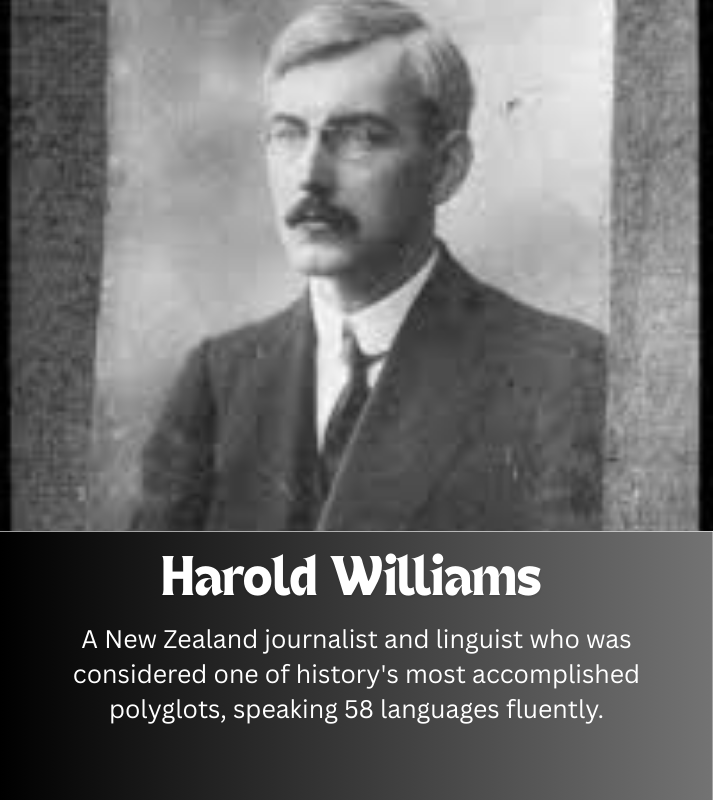Harold Williams
The New Zealand Polyglot


Harold Williams (1893-1976) was a remarkable New Zealand journalist and linguist, celebrated as one of history's most extraordinary polyglots. His astonishing ability to speak 58 languages fluently captivated and inspired many, solidifying his legacy as a true "1 in a million" talent. His linguistic journey was not merely an academic pursuit but a lifelong passion that opened doors to diverse cultures and deep human connections.
Born in Gisborne, New Zealand, Williams’s fascination with languages began early. While other children played, he was often found with books, dictionaries, and grammar guides. This initial curiosity quickly blossomed into an insatiable appetite for learning, and by his teenage years, he had already mastered several European languages. He was driven not by the need for accolades, but by an innate curiosity about how different cultures expressed their world through language.
A Journalist's Global Stage:
Williams's career as a journalist for the New Zealand Press Association provided the perfect platform for his linguistic talents. As a foreign correspondent, he traveled extensively, immersing himself in the local cultures and, most importantly, their languages. Whether he was reporting from the streets of Paris, the bustling markets of Cairo, or the quiet villages of rural China, he was able to communicate directly with people, bypassing the need for interpreters and gaining a unique, unfiltered perspective on the stories he covered. This direct engagement with local populations gave his reporting a depth and authenticity that was rare for his time.
Harold Williams: The New Zealand Polyglot
The Method of Mastery
His linguistic prowess was more than just a party trick; it was a testament to his incredible discipline and a deep respect for human communication. He was known for his systematic approach to language learning, which included meticulous study of grammar, extensive vocabulary memorization, and, most crucially, practicing with native speakers. His belief was that true fluency came not from textbooks alone, but from real, everyday conversation. He saw each new language as a puzzle to be solved, with each piece—a new word, a grammatical rule, a cultural idiom—adding to a richer, more complete picture.
Among the 58 languages Williams spoke, his repertoire was incredibly diverse, spanning from major world languages like French, German, Spanish, and Russian to more obscure and less commonly spoken languages such as Basque, Georgian, and various indigenous dialects. His mastery of each language was so complete that he could effortlessly switch between them, often surprising native speakers with his perfect accent and idiomatic expressions. His ability to navigate such a vast linguistic landscape made him a legend in his own time and continues to inspire linguists and language enthusiasts today.
Legacy
Williams's legacy is a powerful reminder of the potential for human connection through language. In an increasingly globalized world, his story serves as an inspiration to break down communication barriers and embrace the richness of cultural diversity. He proved that with dedication, curiosity, and a genuine love for learning, it is possible to achieve truly extraordinary things. Harold Williams was not just a journalist or a linguist; he was a bridge between cultures, a testament to the power of words, and a true polyglot for the ages.
Discover the extraordinary and unique stories.
Inspire
© 2025. All rights reserved.
